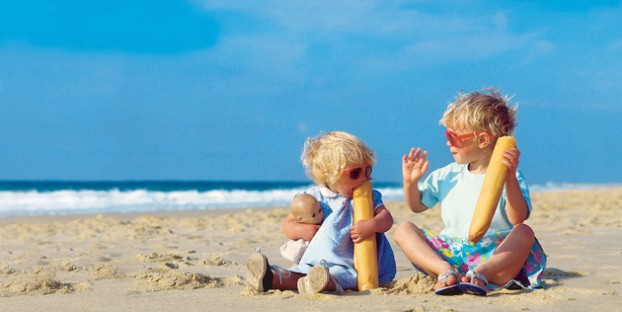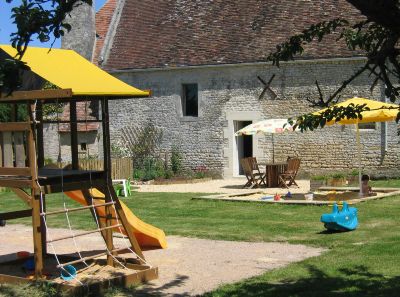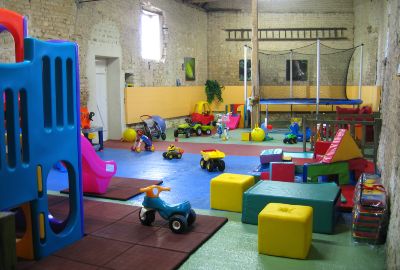
11 May 2012 by Jessica Boston and Sarah Caille
Top 10 Tips for Toddler-friendly French Holidays
Taking young children on holiday is no picnic! Most parents will be able to recall the shock of discovering that holidays with children are no longer, well, holidays! The demands that are sometimes taxing in your well equipped, familiar home can become a nightmare on holiday where everything is different from accommodation and transport to food and drink, any form of routine is out of the window!
In many cases a language barrier can complicate both simple and serious situations adding to stress levels too, and all this while you are ‘supposed’ to be relaxing on a hard earned family break!
Someone who has experienced the pain and pleasure of family holidays is Sarah Caille, founder of ‘Toddler Holiday’ a company that specialises in providing gites in France that are fully equipped for the needs and enjoyment of young children.
“My first experience of holidaying as a family came when my daughter Tilly was a year old. My husband Laurent and I rented a gite in rural France but when we arrived it wasn’t what we were expecting, there was no atmosphere and the whole place was quite depressing – not such a problem when you are child-free as you can just go out, but with a baby we were stuck in every evening. I resorted to buying a lamp at the supermarket just so we could turn off the hideous fluorescent tube lights!
The other problem was that the property wasn’t child-friendly, I remember barricading the stairs with furniture to stop Tilly climbing up and trying to replicate blackout blinds by stuffing quilts in the windows! It made me realize how much difference a well prepared holiday home would have made to us – and I don’t mean cramming the place with toys, high chairs and primary colours, it’s about creating a space where toddlers are safe to explore and parents can relax and unwind.”
This was the inspiration behind Toddler Holiday, which now operates nine specially designed and equipped gites across France. Sarah’s children Tilly and William are 11 and 9 years old now so the difficult years of teething and tantrums are behind her, but we thought we’d draw on her experience and expertise to give you some top tips to make your holiday in France with under 5s as stress free as possible…
1. Choosing your destination
 When planning your holiday with children you need to consider the journey;
When planning your holiday with children you need to consider the journey;
- How easy will it be to reach your holiday accommodation?
- What travel options do you have?
For most families the chance to travel in your own car makes a ferry crossing the best way to get to France, choose ferry ports that reduce the time you need to spend in the car and try to be on the road when children are likely to sleep for a less noisy and stressful journey.
Ferries are great fun for children with plenty to see and do to wear them out! If you do decide to fly and need a hire car be sure to specify the car seats you require on booking or you may find there are none available.
2. When to go
While you may have enjoyed nothing more than lazing in the sun with a good book, with young children on the scene very hot weather often means hot uncomfortable toddlers smothered in sun cream and being trapped inside to keep out of the sun, so try to avoid the South of France in the height of summer.
If you are not constrained to school holidays you will be able to save money by travelling in June or September as the prices drop significantly. On weekends in July and August you can experience extremely bad traffic as 40,000 French people embark on their annual vacation. There is a government website that gives traffic information by grading areas of France with a red, orange or green rating for the weekend so you can avoid the worst affected areas. Visit the site at www.bison-fute.equipement.gouv.fr and click on ‘Weekend forecast’.
3. Child-friendly accommodation
When holidaying with babies and toddlers choosing the right accommodation is more important that ever – after all you’ll be spending more time than usual there with all the necessary naps and early bedtimes so be sure to pick somewhere that you feel you’ll be comfortable. Hotels can seem a daunting prospect with young children and many people prefer the flexibility of self-catering gites, or campsites offering mobile homes.
If you decide on a gite holiday make sure you find out what’s included in terms of linen, and be prepared to make your own beds up when you arrive at most French owned and managed properties. Ask if you can borrow or hire cots, highchairs, stairgates, pushchairs and other essentials to avoid having to bring your own and make sure any pond or swimming pool is adequately fenced off and gardens are secure.
Older children will love a campsite based holiday with its great swimming pools, entertainment, plenty to do and the chance to make new friends. We did a campsite holiday when Tilly and William were 8 and 7 and they loved being able to go off and roam around the campsite independently.
4. Family activities
 When choosing your accommodation look at the activities available in the area to interest all the members of your family – it doesn’t have to be theme parks and ‘attractions’…
When choosing your accommodation look at the activities available in the area to interest all the members of your family – it doesn’t have to be theme parks and ‘attractions’…
A local bakery can be a daily excursion children love as they try out their French and carry home croissants for breakfast or baguettes for lunch – French markets are full of interesting things to see, there are often live chickens and rabbits on display and cheese and cured meat to sample as well as colourful rainbows of fresh fruit and vegetables.
The beach can be a nightmare with very young children who invariably end up eating sand, caked in sun lotion and sand, eyes full of sand, nappy full of sand… you get the picture! Rivers and forests are great alternatives to the beach, take a picnic and go exploring!
I prefer to visit the beach in the colder months – no need for sticky sun cream and still plenty of fun to be had splashing in the surf in our wellies, making sandcastles and peering into rock pools.
5. Public facilities
Travelling with young children usually involves the immortal cry “Mum, I need a wee!” seconds after setting out on any journey so knowing what to expect in France is a must! There are ‘rest stops’ at regular intervals along most main roads but these are usually the traditional hole-in-the-ground style toilets and are often less than clean – don’t go in there wearing crocs is my advice! You’ll get better facilities and baby changing in most restaurants.
6. Bon appétit!
France has a range of pre-prepared baby food that is second to none! It tends to be better seasoned than the blander UK versions as the French consider it important to train their children’s palate with a wide variety of foods – from the age of three French children attend school and sit down for a daily three course lunch!
Lunch really is an important part of the culture in France and the main meal of the day. A lot of businesses close daily between midday and 2pm to allow everyone time to sit and enjoy a midday meal, a three course meal with a two or three options per course costs 10-12€ per head and with children in tow you may find it easier to eat out at lunchtime than in the evening (French restaurants do not start serving the evening meal until around 7.30pm at the earliest).
Most restaurants offer smaller portions of main menu dishes for children and there is generally failsafe spaghetti bolognaise, plain grilled chicken or pizza to be found for the fusspots. Service is usually prompt at lunch-time as people need to get back to work so there shouldn’t be too much waiting around. A certain level of behaviour is expected from children in restaurants, French children are accustomed to sitting at the table for long periods so children running around and creating a lot of fuss is frowned upon.
In France it is traditional for children to have a sweet snack at around 4pm so you could treat your children to a crepe, pastry or ice-cream in a café if a full restaurant meal experience is unlikely to be relaxing for you!
If your baby drinks powdered milk you will probably want to bring enough with you to last for your stay as the brands and ingredients are different in France.
7. Hygiene
Although French tap water is safe to drink, nitrate levels can be high in the countryside so most French people choose bottled water. Vittel and Evian are approved for adding to make up powdered baby milk with no need for boiling making it a convenient option when you’re on the move.
French swimming pools are very clean. Men must wear lycra swimming shorts, the loose board short styles are not allowed in case people wear them as clothes then come in to swim all sweaty! You also have to shower before you enter the pool.
8. Medical matters
If you need to call an ambulance the emergency number from mobile phones is 911.
As most people know you will need to apply for and bring a EHIC (European Health Insurance Card) which will help you claim the cost of any hospital treatment during your stay. The French medical system is amongst the best in the world but it is expensive so this really is worth having.
If you need to go to the GP be prepared to pay for your appointment, your European Health Insurance Card is only valid at hospitals not GP surgeries. Appointments cost around 25€ and you’ll need to pay in cash. French GPs will often prescribe a great number of medications; don’t be surprised if you come away with a list of five or more drugs to get. You’ll also need to pay for your prescription.
Most pharmacy items you might need are available in France although nappy cream can be difficult to explain and Sudocrem is not stocked so bring your own if you use it.
9. Driving in France
If you are driving be sure to keep your insurance documents and registration certificate in the car at all times – it’s a legal requirement. You are also expected to have hi-vis vests and a warning triangle in the boot. New legislation is currently going through that will mean you’ll need to carry a breathalyzer kit too so double check before you travel to make sure. Children need car seats or booster seats if they are under the required heights and children under 10 years old are not allowed to ride in the front seat of the car.
Petrol stations are further apart than we’re used to in Britain so don’t get too low on fuel, the next chance to fill up could be 150km away! And don’t forget to carry plenty of change for the tolls on the Autoroute, credit cards don’t always work and you can cause an embarrassing jam if you are stuck in the gate!
10. Bonnes Vacances!
France is a great place to holiday for families with babies and young children, great food, and wonderful scenery and culture – all just a quick hop over the Channel. Take a break and get a chance to spend quality time with family and friends. There may be stressful moments, but with kids there are stressful moments just staying at home! Embrace the opportunities your holiday offers to create family memories that will last a lifetime.

Great blog. Touching further on child safety in such accommodation, this can extend to apartments or hotels when on holiday. Safety is always of paramount importance to parents when on holiday; and as my fellow parents will i’m sure agree upon, if you’re worrying about your children, then yours, and in face their holiday experience is sorely affected.
You’ve raised some fantastic points well done.
Great article! Nice to see that you’ve mentioned the benefits of mobile homes and camping in France. There are some great campsites out there and many offer children’s clubs which can be of great benefit to children of all ages. As well as having fun they can meet new friends from different countries and backgrounds.